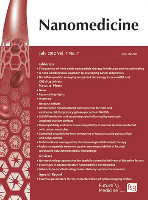
Nanomedicine
Scope & Guideline
Exploring the Intersection of Nanotechnology and Medicine
Introduction
Aims and Scopes
- Nanoparticle-based drug delivery systems:
Research on various nanoparticle formulations designed for targeted and controlled drug delivery, enhancing therapeutic efficacy while minimizing side effects. - Theranostics:
Integration of therapeutic and diagnostic capabilities in nanomedicine, allowing for real-time monitoring of treatment responses and disease progression. - Nanotechnology in cancer treatment:
Exploration of nanomaterials that can be used for cancer therapy, including drug delivery, photothermal therapy, and immunotherapy. - Biocompatibility and toxicity studies:
Investigation of the biocompatibility and potential toxic effects of nanomaterials on biological systems, crucial for their clinical application. - Innovative formulations and synthesis methods:
Development of novel nanoparticles and nanocarriers, including lipid-based, polymeric, and metal nanoparticles, to improve drug solubility and stability. - Nanomedicine for infectious diseases:
Utilization of nanotechnology to enhance the efficacy of treatments against bacterial, viral, and fungal infections, including the development of vaccines. - Nanotechnology in regenerative medicine:
Application of nanomaterials in tissue engineering and regenerative therapies, focusing on enhancing healing and regeneration processes.
Trending and Emerging
- Personalized nanomedicine:
An increasing number of studies are focusing on tailoring nanomedicine approaches to individual patient profiles, enhancing treatment efficacy and safety. - Smart and stimuli-responsive nanocarriers:
Research on nanocarriers that respond to specific stimuli (e.g., pH, temperature, or light) to release drugs at targeted sites is gaining momentum, showcasing advanced delivery systems. - Nanomedicine for chronic diseases:
Emerging research is focusing on the application of nanotechnology in managing chronic diseases such as diabetes and cardiovascular conditions, reflecting a shift towards long-term health management. - Combination therapies using nanotechnology:
There is a growing trend in combining nanomedicine with other therapeutic modalities, such as immunotherapy and gene therapy, to enhance overall treatment outcomes. - Nanotechnology in vaccine development:
The COVID-19 pandemic has accelerated interest in nanotechnology's role in vaccine development, leading to innovative delivery systems and adjuvants. - Artificial intelligence in nanomedicine:
Integration of AI and machine learning in the design, synthesis, and application of nanomedicines is emerging as a significant theme, indicating a technological evolution in the field.
Declining or Waning
- Traditional small molecule therapies:
There is a noticeable decrease in studies focusing on conventional small molecule drugs as researchers shift towards more innovative nanomedicine approaches. - Basic mechanistic studies of nanoparticles:
Research that solely focuses on the fundamental mechanisms of nanoparticle interactions without clinical relevance is becoming less prevalent, as the field moves towards translational research. - In vivo studies in animal models:
Although still important, there is a growing preference for human-relevant models and clinical trials, leading to fewer publications centered on animal studies. - Nanoparticle applications in non-biomedical fields:
The focus on nanotechnology applications outside of direct medical contexts, such as environmental or industrial applications, is diminishing within the journal's scope.
Similar Journals

Advances in Nano Research
Unveiling the Potential of NanomaterialsAdvances in Nano Research, published by TECHNO-PRESS, is a prominent academic journal dedicated to advancing knowledge across various facets of nanoscience and nanotechnology. With its ISSN of 2287-237X and E-ISSN 2287-2388, this journal serves as a vital resource for researchers and professionals, focusing on areas such as Atomic and Molecular Physics, Biotechnology, Catalysis, Ceramics and Composites, and Electrical Engineering. Since its inception in 2017, the journal has notably achieved Q2 ranking in multiple categories for the year 2023, reflecting its commitment to high-quality research dissemination and its increasing influence in Scopus rankings, including ranks within the top 12% in Chemical Engineering. While Open Access options are currently unavailable, the rigorous peer-review process ensures that only the most impactful studies are published, further solidifying its importance within the academic community. As a significant player in the fields of engineering and materials science, Advances in Nano Research aims to foster innovation and collaboration, making it an essential publication for those engaged in cutting-edge research and development within the realm of nanotechnology.

Materials
Advancing knowledge in materials science and condensed matter physics.Materials is an esteemed journal published by MDPI, dedicated to advancing the fields of Condensed Matter Physics and Materials Science. With its commitment to Open Access since its inception in 2008, the journal has made significant strides in disseminating high-quality research globally, allowing researchers, professionals, and students easy access to cutting-edge studies without financial barriers. Hailing from Switzerland, the journal has shown remarkable growth and prominence, currently ranked in the Q2 quartile in its categories according to the latest assessments, which highlights its impact within the community. As the journal converges its focus from 2008 to 2024, it aims to continually foster a robust exchange of knowledge on innovative materials and their applications, thereby supporting the evolving landscape of science and technology. With an E-ISSN of 1996-1944 and a user-friendly platform, Materials is poised to be a leading choice for scholars eager to contribute to and engage with pioneering research.

Biomaterials Research
Transforming research into real-world applications.Biomaterials Research, published by the American Association for the Advancement of Science, is a prominent open access journal established in 2014, dedicated to advancing the field of biomaterials. Based in the United Kingdom, this journal has swiftly become an essential platform for researchers and practitioners, offering groundbreaking insights in biomaterials, biomedical engineering, ceramics and composites, and miscellaneous medical fields. With its impressive Q1 ranking across multiple relevant categories in 2023 and its strong Scopus rankings, including a remarkable 90th percentile in the medicine category, Biomaterials Research showcases high-quality, peer-reviewed research designed to address both practical and theoretical challenges in biomaterials science. As an open access journal, it promotes wider dissemination and accessibility of research findings, crucial for fostering innovation and collaboration within the scientific community. Researchers, professionals, and students alike are encouraged to contribute, read, and engage with the latest developments in this dynamic field.

Advanced Therapeutics
Driving impactful research in advanced therapeutics.Advanced Therapeutics, published by WILEY in the United Kingdom, stands at the forefront of medical and pharmaceutical research, offering invaluable insights from 2018 to 2024. This distinguished journal, with an E-ISSN of 2366-3987, is recognized for its exceptional academic rigor, boasting an impressive array of Q1 categorizations in essential fields such as Biochemistry (medical), Pharmaceutical Science, and Pharmacology. With its strategic focus on interdisciplinary studies and cutting-edge therapeutic developments, Advanced Therapeutics serves as a vital resource for researchers, professionals, and students keen on advancing their knowledge and contributing to the evolving landscape of medicine and genetics. The journal's high Scopus rankings further affirm its impact, with significant placements in multiple categories underscoring the quality of published research. Although the journal operates under a subscription model, its accessibility to high-impact findings ensures that it remains a pivotal platform for innovative discourse in therapeutics.
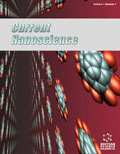
Current Nanoscience
Innovating the Future of NanotechnologyCurrent Nanoscience is a prominent journal published by Bentham Science Publishers Ltd, dedicated to advancing the field of nanoscience through the dissemination of high-quality research and review articles. Since its inception in 2006, the journal has provided a platform for innovative studies across a variety of related disciplines, including bioengineering, biomedical engineering, biotechnology, and nanotechnology, reflecting its diverse scope and interdisciplinary nature. With a Q3 ranking in several categories such as Biomedical Engineering and Pharmaceutical Science and a Scopus percentile ranking around the 60th in its field, Current Nanoscience serves as a vital resource for researchers and professionals seeking to stay abreast of the latest developments and breakthroughs. Although it operates without an open access model, the journal maintains a commitment to enhancing accessibility and relevance in the scientific community. The editorial team is focused on publishing articles that address both theoretical and practical aspects of nanoscience, ensuring that the findings contribute to knowledge and innovation in areas critical to technology and healthcare.

BioNanoScience
Fostering Collaboration for a Healthier Tomorrow.BioNanoScience is an esteemed academic journal published by SPRINGER, dedicated to the interdisciplinary field of bioengineering and biomedical engineering. With an ISSN of 2191-1630 and an E-ISSN of 2191-1649, the journal has established itself as a significant platform for sharing innovative research and developments in nanotechnology as applied to biomedical contexts. Although it operates under a subscription model, the journal maintains a strong impact within its field, achieving a Q3 quartile ranking in both categories for 2023 and has a solid standing in Scopus rankings, where it ranks #129 out of 303 in Biomedical Engineering and #87 out of 162 in Bioengineering. The journal not only aims to publish high-quality research, but also seeks to foster collaboration between scientists, engineers, and healthcare professionals to address pressing global health challenges through nanotechnology. As an essential resource for researchers, professionals, and students, BioNanoScience continues to contribute to the advancement of knowledge and innovation in bioengineering.
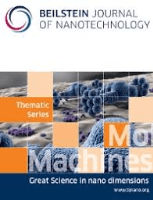
Beilstein Journal of Nanotechnology
Advancing the frontiers of nanotechnology research.The Beilstein Journal of Nanotechnology is a prominent open access journal published by the Beilstein Institute that has been at the forefront of nanotechnology research since its inception in 2010. With a focus on cutting-edge developments in areas such as Electrical and Electronic Engineering, Materials Science, and Physics and Astronomy, this journal is ranked in the Q2 category across multiple scientific disciplines, reflecting its significant impact within the research community. The journal is accessible to a global audience and aims to foster innovation and application of nanotechnology across various fields. Featuring a rich convergence of interdisciplinary studies, the Beilstein Journal of Nanotechnology offers a platform for researchers to share their findings, thus advancing the frontiers of knowledge in this dynamic field. With publishers based in Frankfurt am Main, Germany, it continues to contribute to the scientific dialogue on nanoscience and its practical applications, making it an essential resource for academics, professionals, and students eager to stay at the cutting edge of technology.
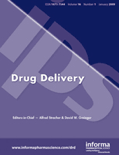
DRUG DELIVERY
Unlocking New Horizons in Therapeutics and Delivery SystemsDRUG DELIVERY is a premier academic journal published by TAYLOR & FRANCIS LTD, with a steadfast commitment to advancing research in the fields of medicine and pharmaceutical sciences. As an Open Access journal since 2017, it offers unparalleled accessibility to its high-quality content, making it an invaluable resource for researchers, professionals, and students alike. With an impressive 2023 impact factor, it ranks in the Q1 quartile for both Medicine (miscellaneous) and Pharmaceutical Science, evidencing its significant impact within the scientific community. The journal focuses on innovative drug delivery systems, therapeutics, and methodologies that enhance patient care and treatment options. Based in the United Kingdom, it has evolved since its inception in 1993 to create a richly diverse platform for scholarly dialogue and advancements in the pharmaceutical landscape. Researchers looking to stay at the forefront of drug delivery research will find DRUG DELIVERY an essential companion in their pursuits.
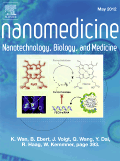
Nanomedicine-Nanotechnology Biology and Medicine
Elevating Medical Research with Nanotechnology InsightsNanomedicine-Nanotechnology Biology and Medicine is a leading journal published by Elsevier, dedicated to the exploration of innovative applications of nanotechnology in the fields of biology and medicine. With an ISSN of 1549-9634 and an E-ISSN of 1549-9642, this esteemed journal provides a platform for high-quality research, comprehensively covering areas including bioengineering, biomedical engineering, pharmaceutical science, and nanoscience. Notably, it holds a significant position in various categories with a Q2 ranking in multiple disciplines and a prestigious Q1 ranking in Pharmaceutical Science, emphasizing its impact within the scientific community. By facilitating access to cutting-edge studies and advancements, Nanomedicine-Nanotechnology Biology and Medicine serves as an essential resource for researchers, professionals, and students alike, contributing significantly to the ongoing development of nanomedicine and its pivotal role in improving healthcare outcomes. The journal operates without open access; however, it remains committed to disseminating valuable knowledge to a global audience.

Biomaterials Advances
Unleashing Potential: The Next Wave of Biomaterials InnovationBiomaterials Advances is a premier journal published by Elsevier, dedicated to the rapidly evolving field of biomaterials. Established in the United Kingdom, this open-access journal aims to disseminate high-quality, peer-reviewed research that explores innovative biomaterial designs and their applications in bioengineering and biomedical engineering. With an impressive 2023 impact factor reflected in its Q1 rankings across multiple categories—including Bioengineering, Biomaterials, and Biomedical Engineering—Biomaterials Advances stands out as a critical platform for scholars and practitioners faced with advancing technologies and methodologies in the realm of materials science. Covering a broad range of topics, from biocompatibility to tissue engineering, this journal provides an inclusive forum for researchers seeking to contribute to the field. Its Scopus rankings further affirm its position as a leading resource, with notable standings in Biomedical Engineering (Rank #13), Biomaterials (Rank #8), and Bioengineering (Rank #11), all within the top percentiles. Researchers and students alike are encouraged to contribute and engage with the latest findings and innovations in biomaterials through this valuable publication.